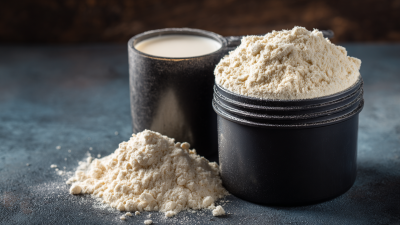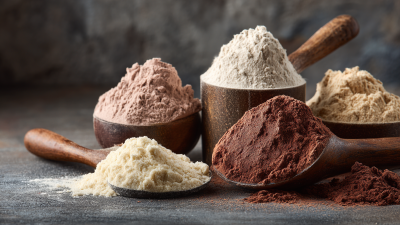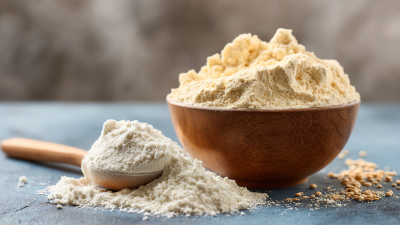In the ever-evolving landscape of health and fitness, selecting the right Protein Powder for your business needs can be a pivotal decision. With countless options available, from whey to plant-based formulations, understanding the nuances of each type is crucial for catering to your target audience. This ultimate guide will walk you through the essential factors to consider when choosing the perfect Protein Powder, ensuring that you make informed decisions that align with your business goals. Whether you're looking to enhance your product line or provide customers with tailored nutritional solutions, mastering the selection process of Protein Powder types will not only elevate your brand but also foster customer loyalty and satisfaction.

Join us as we explore the key attributes, benefits, and considerations that will empower your business to thrive in the competitive wellness market.
When selecting the best protein powder for your business needs, understanding the various types available is crucial. The protein powder market is constantly evolving, with the global protein supplement market projected to grow to approximately $23.6 billion by 2027, according to a recent industry report. This growth reflects a rising awareness of health and fitness among consumers, and businesses must keep pace by offering high-quality protein products.
Whey protein, casein, soy, and plant-based options like pea and brown rice protein are among the most popular types. Whey protein, derived from milk, is known for its quick absorption and is favored by athletes. In contrast, casein digests slowly, making it ideal for meal replacements. For those catering to vegan or lactose-intolerant customers, plant-based proteins are becoming increasingly vital, as they are not only healthier but also more sustainable.
**Tips:** Always consider your target audience when selecting a protein powder. For fitness enthusiasts, whey or casein might be best, while vegan options will appeal more to health-conscious consumers. Additionally, sourcing high-quality ingredients can enhance product credibility and improve customer loyalty. Stay updated on market trends to adapt your offerings accordingly.
This chart compares the protein content in various types of protein powders available in the market. Each type has its unique nutritional profile, making them suitable for different dietary needs and preferences.
When choosing protein powder for your business needs, several key factors should be considered to ensure you select the best product for your target market.
The protein supplements sector is currently booming, with the U.S. protein supplement market projected to reach $22.58 billion by 2032, growing from $9.88 billion in 2024. This growth is driven by the increasing demand for fitness and dietary supplements, highlighting the importance of choosing the right protein source that aligns with consumer preferences.
One essential factor is the type of protein. There are various options, such as whey, casein, plant-based, and insect protein, each catering to different dietary restrictions and tastes. For instance, the rising interest in alternative proteins, including insect protein, is fueled by urbanization and the nutritional value of edible insects. It's vital to understand your audience's needs, especially in a market where innovations in food technology are rapidly evolving.
Tip: Always consider your product's nutritional profile and sourcing. Ensure you choose high-quality, sustainably sourced protein powders that appeal to health-conscious consumers. Additionally, keeping an eye on market trends, such as the anticipated growth of the cricket farming market expected to reach $18.368 million by 2032, can provide insights into emerging opportunities for your business.
 When it comes to selecting the best protein powder for your business needs, the importance of sourcing quality ingredients cannot be overstated. Protein powders serve as a fundamental component in many health and fitness products, and consumers are increasingly discerning about what goes into their supplements. High-quality protein sources, such as whey, casein, and plant-based proteins, can significantly impact the efficacy of your products and customer satisfaction.
When it comes to selecting the best protein powder for your business needs, the importance of sourcing quality ingredients cannot be overstated. Protein powders serve as a fundamental component in many health and fitness products, and consumers are increasingly discerning about what goes into their supplements. High-quality protein sources, such as whey, casein, and plant-based proteins, can significantly impact the efficacy of your products and customer satisfaction.
Tip 1: Always prioritize sourcing from reputable suppliers who provide transparency regarding their ingredient origins. Look for certifications such as non-GMO, organic, and third-party testing results to ensure that the protein powders you choose are free from contaminants and additives.
Quality ingredients extend beyond just the protein source. The inclusion of additional nutrients and flavorings must also meet high standards. Consumers are keen on avoiding artificial flavors and sweeteners.
Tip 2: Consider partnering with suppliers that focus on clean label products and can offer blends enriched with vitamins, minerals, and digestive enzymes. This not only enhances the nutritional profile but also adds value to your offerings and aligns with the growing consumer preference for clean, wholesome nutrition.
When selecting the best protein powder for your business, understanding labeling and nutritional information is crucial. Consumers today are more informed and health-conscious than ever, and they expect transparency from the brands they choose. An effective label should provide clear information about the protein source, whether it’s whey, casein, soy, or plant-based. Additionally, details about amino acid profiles and serving sizes help customers make informed decisions that align with their dietary preferences and fitness goals.
Nutritional information on your product is not just a regulatory requirement; it’s an opportunity to build trust with your customers. Ensure that the label highlights key nutritional facts such as protein content per serving, calorie count, and the presence of any allergens. Many consumers also look for certifications, such as organic or non-GMO labels, which can further influence their buying choices. By prioritizing comprehensive and clear labeling, you set your product apart in a competitive market, meeting customer expectations while promoting informed consumption.

When it comes to selecting the best protein powder for your business, cost-effectiveness plays a pivotal role in the decision-making process. It’s essential to strike a balance between quality and price, especially in an industry where customer loyalty often hinges on product efficacy and results. While it can be tempting to opt for the cheapest option, understanding the value of high-quality ingredients and processing can save your business from potential fallout down the road. Quality protein powders often contain essential amino acids, are free from fillers, and provide better bioavailability, ensuring that your customers receive the best nutrition possible.
Moreover, analyzing your target market is crucial to determining the right price point. For example, if your customer base consists of fitness enthusiasts who prioritize performance, they may be willing to pay a premium for superior nutrition. Conversely, budget-conscious consumers may seek affordable options that still deliver solid nutritional benefits. Conducting market research and assessing competitor pricing can help you position your protein powder effectively. Ultimately, the goal is to offer a product that meets both quality standards and customer expectations while optimizing your business’s profit margins.
| Protein Type | Cost per Serving ($) | Protein Content (g) | Quality Rating (Out of 5) | Flavor Options |
|---|---|---|---|---|
| Whey Protein | 1.50 | 24 | 4.5 | Vanilla, Chocolate, Strawberry |
| Casein Protein | 2.00 | 24 | 4.2 | Chocolate, Cookies & Cream |
| Soy Protein | 1.75 | 20 | 4.0 | Vanilla, Chocolate |
| Pea Protein | 1.80 | 25 | 4.1 | Chocolate, Vanilla, Berry |
| Hemp Protein | 2.25 | 15 | 3.8 | Natural, Chocolate |






